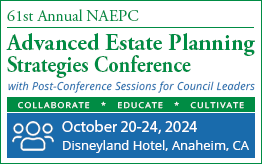October, 2019 Newsletter
Provided by Leimberg Information Services
See other issues.
Estate and Tax Planning Roadmap for 2019-2020: Martin M. Shenkman, Jonathan G. Blattmachr, Joy Matak, & Sandra D. Glazier
“Tax reform at the end of 2017 (the “2017 Act”) changed the planning landscape. While many clients and even practitioners see little need for estate tax minimization planning in light of the high exemptions, others see an opportunity to shift wealth, implement asset protection strategies utilizing the higher exemptions, and so forth. There was also a marked shift in planning discussions from estate tax to income tax, although it is less clear as to how much actual planning, utilizing non-grantor trusts for an array of income tax planning benefits has occurred.
The changes to planning were, in some instances profound, with practitioners having to craft completed gift trusts that were able to secure the benefits of the high temporary exemption, non-grantor status for state and local tax (“SALT”) or other benefits, while still preserving access to the trust assets given the size of the exemption relative to the net worth of even wealthy clients. These seemingly contradictory goals required rethinking many aspects of trust planning and drafting. In addition to the use of non-grantor trusts described above, it has become common to change what had been the traditional “A-B” trust dispositive scheme to a plan bequeathing assets to a marital trust that could be disclaimed, or transferred via a Clayton election, to a credit shelter disposition, to facilitate the possibility of obtaining a second basis step-up on the death of the surviving spouse. Some have added clauses to credit shelter trusts to enhance the flexibility to shift assets back into the estate to obtain a basis step-up. The use of general powers of appointment to cause trust assets to be included in the client’s estate, or the estate of an older generation family member whose estate is less than the exemption (so-called “upstream” planning), has also become common.
With a possible shift of control in Washington on the horizon, various demographic trends, and increasing elder financial abuse, the challenges have become ever more complex. This article will explore various planning strategies that practitioners may employ to help clients capitalize on the estate tax environment created by the 2017 tax act, with consideration of these newer developments and trends.
In this world of constant uncertainty, only one thing is clear, planners need a roadmap in order to be successful in crafting strategies to preserve and protect their clients’ wealth.
What follows is a discussion of a wide range of planning considerations in this challenging planning environment. Some of the planning points in this article have been adapted from several prior LISI newsletter and other articles and presentations.”
Martin M. Shenkman, Jonathan G. Blattmachr, Joy Matak, andSandra D. Glazierprovide members with their “Estate and Tax Planning Roadmap for 2019-2020.”
Martin M. Shenkman, CPA, MBA, PFS, AEP, JD is an attorney in private practice in Fort Lee, New Jersey and New York City who concentrates on estate and closely held business planning, tax planning, and estate administration. He is the author of 42 books and more than 1,200 articles. He is a member of the NAEPC Board of Directors (Emeritus), on the Board of the American Brain Foundation, and the American Cancer Society’s National Professional Advisor Network.
Jonathan G. Blattmachr is a retired member of Milbank (formerly Milbank, Tweed, Hadley & McCloy LLC) and of the Alaska, California and New York bars. He is Director of Estate Planning of Peak Trust Company, the Editor-in-Chief of Interactive Legal and a Director of Pioneer Wealth Partners, LLC. He is also the author or co-author of nine books and over 500 articles. He was the principal drafter of the Alaska Trust Act and the Alaska Community Property Act.
Joy Matak, JD, LLM, is a principal atCohnReznick and Co-Leader of the Firm’s Trusts and Estates Practice. She has more than 20 years of diversified experience as a wealth transfer strategist with an extensive background in providing tax services to multi-generational wealth families, owners of closely-held businesses, and high-net-worth individuals and their trusts and estates. Joy provides clients with wealth transfer strategy planning to accomplish estate planning and business succession goals. She also performs tax compliance including gift tax, estate tax, and income tax returns for trusts and estates as well as consulting services related to generation skipping including transfer tax planning, asset protection, life insurance structuring, and post-mortem planning. Before joining CohnReznick, Joy was a senior tax manager at a Top 20 accounting firm.
Joy presents at numerous events on topics relevant to wealth transfer strategists including engagements for the ABA Real Property, Trust and Estate Law Section; the Greater Middlesex/Somerset Estate Planning Council; and the Society of Financial Service Professionals. Joy has authored or co-authored articles for the Tax Management Estates, Gifts and Trusts (BNA) Journal; Leimberg Information Services, Inc. (LISI); and Estate Planning Review The CCH Journal), among others, on a variety of topics including wealth transfer strategies, income taxation of trusts and estates, and business succession planning. She recently co-authored a book on the new tax reform law entitled Estate Planning: Estate, Tax and Other Planning after the Tax Cuts and Jobs Act of 2017.
Sandra D. Glazier, Esq., AEP, is an equity shareholder atLipson Neilson, P.C., in its Bloomfield Hills, MI office. She is also the recent recipient of Bloomberg Tax’s Estates, Gifts and Trusts Tax Contributor of the Year Award and Trusts & Estates Magazines Authors Thought Leadership Award. Sandra concentrates her practice in the areas of estate planning and administration, probate litigation and family law.
Because of the length of their commentary, readers may access it through this link:Estate and Tax Planning Roadmap for 2019-2020.
HOPE THIS HELPS YOU HELP OTHERS MAKE APOSITIVE DIFFERENCE!
Martin M. Shenkman
Jonathan G. Blattmachr
Joy Matak
Sandra D. Glazier
CITE AS:
LISI Estate Planning Newsletter #2745 (September 3, 2019) at http://www.leimbergservices.com Copyright 2019 Leimberg Information Services, Inc. (LISI). Reproduction in ANY Form or Forwarding to ANY Person – Without Express Permission – Prohibited.
All NAEPC-affiliated estate planning councils are eligible to receive a discounted subscription rate to the Leimberg LISI service. Please see more information about the offering. You may also contact your local council office / board member to find out whether they are offering the service as a member benefit.




